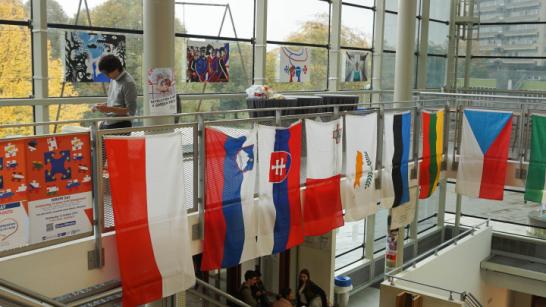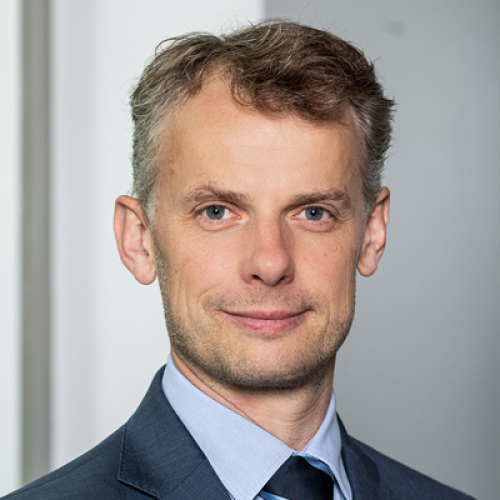
On 16 October 2019 the VUB International Relations office organised its first Europe Day. The theme of the day was the 15th anniversary of the EU’s biggest enlargement, when 10 countries joined the European Union: Cyprus, Malta, Czech Republic, Hungary, Estonia, Latvia, Lithuania, Poland, Slovakia and Slovenia.
Part of the EU day programme was an academic panel debate, organised in cooperation with the Institute for European Studies at VUB (now: Brussels School of Governance), the Jean Monnet Chair and International Relations Office. The debate focussed on “15 years after enlargement, are we growing together or moving apart?”, with opening comments by IES’s Vice Dean for Research, Professor Alexander Mattelaer, and Dr Rado Genorio, Ambassador of Slovenia to Belgium. The panel debate was chaired by Jean Monnet Chair at IES, Professor Florian Trauner and the panel itself included Ms Kamila Partyka from the European Commission, Professor Gergana Noutcheva from the University of Maastricht, Professor Amandine Crespy from the Université Libre de Bruxelles (ULB) and Dr Rafał Szmytka from Jagiellonia University in Poland.
Those who registered for the event, had the opportunity to send in their question to the panel in advance. These questions were used in the debate that followed. Professor Mattelaer in his opening comments indicated how 20% of incoming exchange students at VUB come from one of the 10 countries which joined the EU in 2004, and Dr Rado Genorio explained more about Slovenia in the run-up to joining the EU. Today, it is a country with an impressive growth rate, and the highest GDP/capita in the EU.
Kamila Partyka from the European Commission explained further the backdrop to 73 million people joining the EU in 2004. It really was a tremendous change, in an economic, social and cultural sense. From an education point of view, Cyprus and Lithuania today have the highest number of university graduates (57%) in the EU, but there is an ongoing need for educational mobility and foreign language learning. It is clear, however, that the newer Member States are lagging behind in terms of research due to underfunding. Ms Partyka indicated that in the future, the Erasmus programme would undoubtedly continue but needs more investment.
Professor Noutcheva broached the issue of democracy, indicating it is in crisis globally. The EU is certainly an economic success story, but there is a perception among the newer Member States that they are indeed better off but retain a feeling of not quite being on a par with the Western Member States and are somewhat regarded as second-class Members of the EU. Professor Noutcheva indicated there has also been a push back against illiberalism in some parts of Europe. However, she points out it is a domestic issue, and needs to be resolved from the bottom-up.
Professor Amandine Crespy from the ULB looked at how to tackle the social inequalities between the Member States. She pointed out that the EU can do much more in terms of policies to enhance the EU’s social cohesion. Mobility, she added, wasn’t just for training and education but for work too. This is something which must be fair, and the EU needs to address the imbalance, so workers are not in competition with one another. Educational and training mobility also tend to be choices; mobility for work-reasons must also be a choice. When it comes to social justice and policy though, more investment is needed across the EU.
Dr Rafał Szmytka, from the Jagiellonian University in Poland, gave an overview of Erasmus exchanges (incoming/outgoing) at the Polish university and how local politics had an influence on these fluctuations. This prompted an audience question regarding brain drain from the newer Member States. Brain drain is certainly an issue, stated the panel, in e.g. the Baltics and it impacts a country’s competitiveness. Countries need to invest more to retain their younger generations. In addition, most universities do not have an overview of where their graduates end up working, and one could wonder about possible mismatches between studies chosen and jobs. Checking EU trends in this regard isn’t easy. In addition, in a lot of the newer Member States there is a lack of tradition of universities working with the business sector. This needs further promotion, with improvement of the curricula which need to be more connected to the working world.
Before the panel concluded, there was a short exchange about whether the EU should open up talks regarding possible accession with North Macedonia and Albania, and of course Brexit got a mention. The drinks at 5pm was an excellent and pleasant way of closing a very successful first Europe Day.
